POLITICS
Seoul mayoral election to decide on Ahn's fate
Ahn's approval rating falls
after inauguration of NPC
The lineup of people of the New Politics Committee (NPC) of Rep. Ahn Cheol- soo (Ind.), a preparatory organization for an Ahn party, does not seem to appeal to the people in South Korea at this time as much as Ahn might have anticipated. The Korean people had expected some well-known people of centrist tendency to fill Ahn’s party; however, the finally announced list of people appears to fall much short of their expectations, especially the middle-of-the-roaders who are known to account for 52% of the total population of the Republic of Korea. 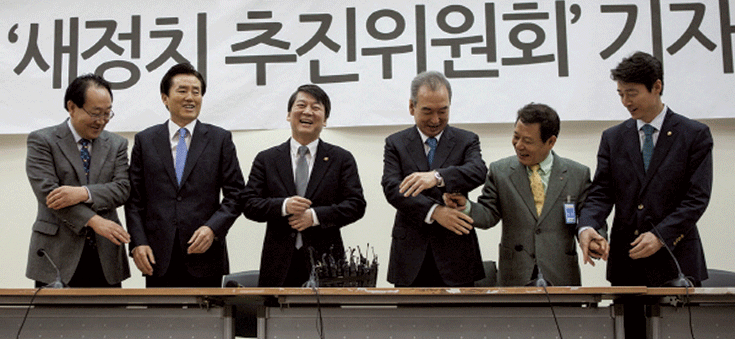

Such responses of the people were immediately apparent at an opinion survey conducted by Research View published on Dec. 19, 2013 shortly after Ahn’s disclosure of the members of his NPC.
The poll showed the ruling Saenuri Party winning 40.6% followed by Ahn’s NPC with 18.6%, Democratic Party (DP) with 14.2%, Unified Progressive Party (UPP) with 3.6% and Justice Party (JP) with 2.9%. Some 20.1% said they had no political party they wanted to support.
This latest survey result poses a striking contrast with the most of the polls conducted earlier on the different political parties, including one to be formed by Ahn.
A typical example is the polls conducted by Korea Gallup on Nov. 29, 2013, which showed Saenuri winning 35% followed by Ahn party (yet to be formed) with 26% and DP with 11%.
Another past survey published by the Korean-language Internet newspaper, NEWSIS, on Oct. 27, 2013 had Saenuri winning 38% followed by Ahn party with 27% and DP with 12%.
The latest survey by Research View shows Ahn losing 7.4% from the previous points while Saenuri gaining 5.6% and DP retrieving 3.2%.
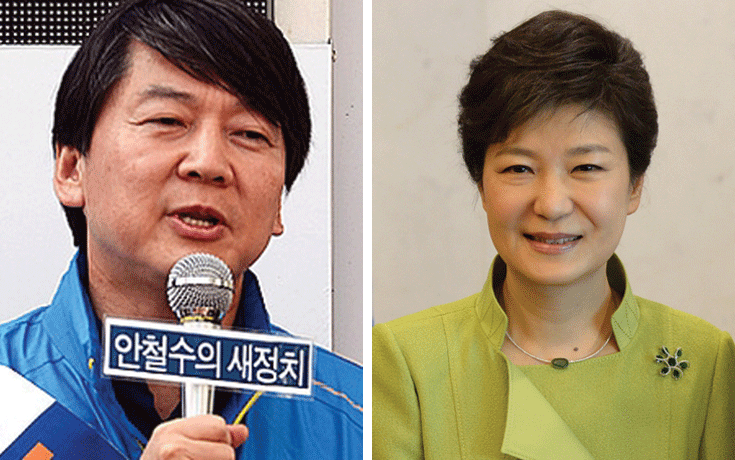
What’s causing Ahn to lose his supporters who mostly form the center-oriented people in Korea?
It appears that the list of people leading Ahn’s NPC fails to measure up to the expectations of the people.
When Ahn announced the formation of his NPC on Dec. 13, 2013, he presented as leading members former DP Assemblyman Lee Kye-an, former DP Assemblyman Kim Hyo-seuk, former Science- Technology Minister Park Ho-koon (dean of Korean-German Institute of Technology), President Yoon Jang-hyun of Gwangju Vision 21 and incumbent DP National Assemblyman Song Ho-chang.
Political reporters and editors may know them all perhaps, but to the common people none of them are very familiar names.
There may be other causes boosting the image of the ruling camp at the expense of the opposition camp, especially Rep. Ahn and his NPC.
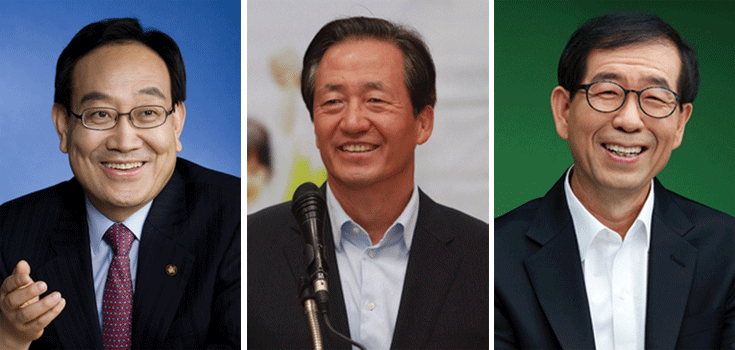
When the country is in a critical situation such as now when South Korea faces the belligerent North Korean regime that might just do anything to get out of the extremely difficult situation it faces following Chairman Kim Jong-Un’s bloody purge of his own uncle, the Number Two Man in the North Korean hierarchy. (Incidentally, various opinion surveys indicate the popularity rating of President Park Geun-hye ranging around 50% which is by no means so low considering the political situation in South Korea today when over 50% of the people demand special investigations into the National Intelligence Service’s suspected meddling in the last Presidential election in favor of the then Saenuri Party Presidential Candidate Park Geun-hye, while 31% are against it.)
At this moment, Ahn appears to be concerned more with the upcoming gubernatorial and mayoral elections.
For instance, Ahn went down to Busan on Dec. 19, 2013 and told the Busan citizens, “Please be the beacon of new politics (Ahn’s trade mark political stand) for the people of the Busan Metropolitan City which always stood in the vanguard of important political reforms in Korea.”
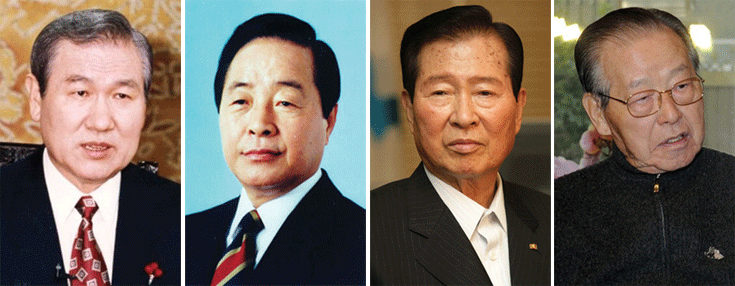
Ahn told the audience, “I came to Busan to hear the voices of the Busan citizens who want to change the Korean politics at this time when demand for new politics has never been higher.”
Then he said that Busan should now free themselves from the shackles which were put on them in 1990 when former President Kim Young-sam won the election by a three-party merger (among the then ruling Democratic Justice Party of President Roh Tae-woo, moderate opposition United Democratic Party of President Kim Young-sam and the second opposition New Democratic Republican Party of former Prime Minister Kim Jong-pil). This was done at the expense of the strong opposition Democratic Party of Peace of President Kim Dae-jung. In the eyes of the pure oppositionists, this three-party merger was considered a ‘political collusion’ devoid of legitimate ground. Busan has thence been the home of the ruling camp represented by the conservatives.
Ahn was born in Busan which therefore is his home town, and has a good measure of support in the so-called Yeongnam (Gyeong- sang provincial) region. Ahn has been married to a woman from the rival region of Jeollanam-do province (Suncheon City), wherefore he enjoys also a considerable measure of support from both the Gyeongsang and Jeolla provincial regions.
He told the audience, “I came to Busan to hear the voices of the Busan citizens who want to change the Korean politics at this time when demand for new politics has never been higher.”
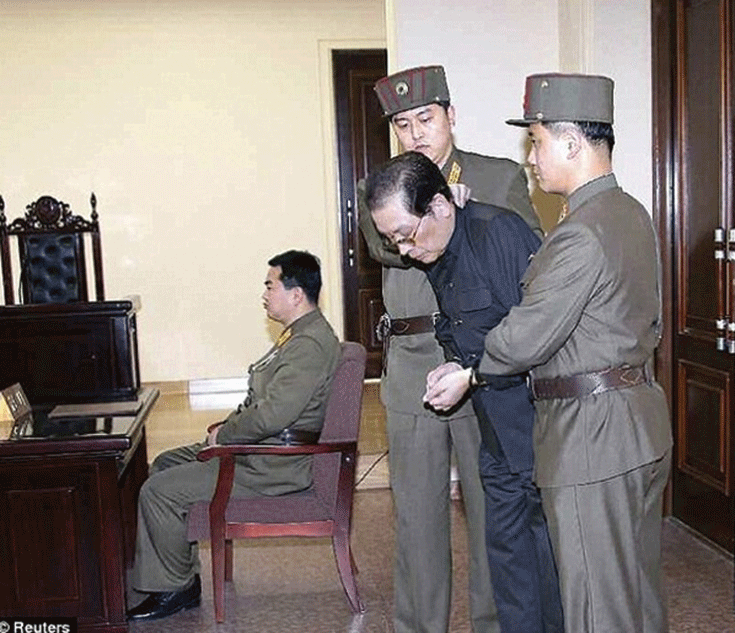
Ahn himself does not admit it clearly at this time, but political observers in Seoul speculate that Ahn had in mind his party’s candidates for the gubernatorial and mayoral elections slated in June next year. They predict that Yoon Jang-hyun is for running in the local autonomy election as his NPC candidate for the Gwangju Metropolitan City which is considered the hub of the oppo- sition-strong Jeollanam-do pro- vince, former Assemblyman Kim Hyo-sun for the governorship of the Jeollanam-do Province, former DP Assemblyman Lee Kye-an for Seoul mayoral election and former Science-Technology Minister Park Ho-goon for the Incheon Metropolitan City (as he hails from Incheon).
Seoul, the capital city of the Republic of Korea, has about one quarter of the total population of the country and winning the local election here in June 2014 will have a great measure of influence on the outcome of the Presidential election in 2017 as well as on the parliamentary elections in April 2016.
According to opinion polls on the candidates for the Seoul mayor elections before the formation of Ahn’s NPC, former Chairman Chung Mong-joon of the ruling Saenuri Party used enjoy more than 50% support rating followed by incumbent Mayor Park Won-soon with a little over 40%. Now with former DP Assemblyman Lee Kye-an joining race from Ahn’s NPC, the competition is going to become a wholly new ball game.
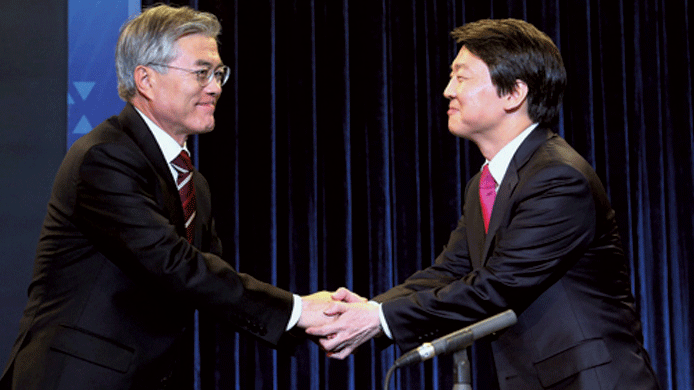
Incidentally, both Chung and Lee are from the same Hyundai Business Group, Chung in charge of heavy industries and Lee in charge of Hyundai Motors. The difference between Chung and Lee is while Chung is a member of owner (Chung) family, Lee is a hired professional business manager.
In the last Seoul mayoral elections, Park Won-soon competed with Ahn Cheol-soo and he was no match for Ahn because Park had only a five-percent support rating in opinion polls while Ahn enjoyed over 55%. However, Ahn, perhaps with the Presidential election in mind, conceded the Seoul candidacy to Park asking the Seoul citizens to support Park for him. Park won the election mainly thanks to the support given by Ahn because he, as mentioned earlier, had only a five-percent support rating at most of the opinion polls.
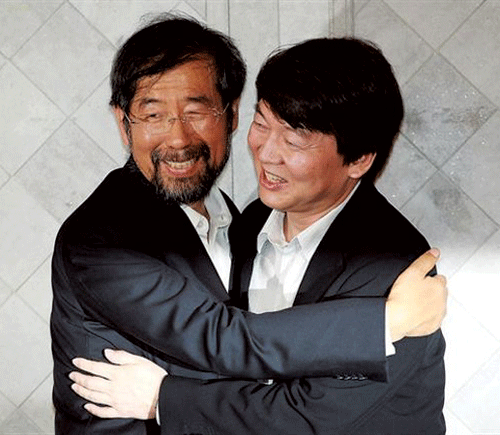
On Dec. 17, 2013, Chung declared at the Year-end party of the ruling Saenuri Party’s Seoul City Chapter, “For whatever elections I may be drafted to run as the party candidate, I will not decline the offer,” which clearly indicated that he will run in the Seoul mayor race.
Chung has an enormous measure of wealth as a member of the owner family of the Hyundai Business Group (Hyundai Heavy Industries), while Lee was a hired CEO of the Hyundai Motors which puts him out of comparison in terms of financial comfortableness at the time of election.
Furthermore, Seoul has a formidable well-to-do stratum of people especially in the Gangnam region south of the Han River and a middle-class, while it also has common people. Against the backdrop of this political picture, it is very difficult to predict the winner in the Seoul mayoral election?especially at this time when Ahn is behind Lee.
Ahn has now started his ‘stumping tour’ of the all localities of the Republic of Korea in the name of ‘New Politics Forum.’
Ahn’s NPC has strong supporters in the two Jeolla provinces (formerly the power seat of the Democratic Party of the late former President Kim Dae-jung), Seoul and the surrounding areas of Seoul called Capital Zone including the satellite cities of Seoul in the Gyeonggi Province.
Whether Ahn will succeed in making his candidate win in the Seoul mayoral election next June will substantially change the picture of the National Assembly elections in April 2016 and the Presidential election in 2017. k

